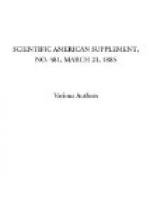“Wonder worker in developing energy in the strongest individuals, and massing wealth in masterful states; but, since competitive trading can never be wholly beneficent, it should be strictly controlled, in the interests of the toiling millions, who are too weak successfully to oppose its attacks. The results of forcing on the naturally weak, by means of competition, hard and unequal bargains which are evaded by the strong, are appalling in their magnitude, dividing whole peoples permanently into castes, rich and poor, injuring the former by excess, and the latter by deprivation, making a nation strong in the trading instinct, and rich in accumulated wealth, but weak and poor in all its other parts. This abuse is saddest of all when, failing to be recognized as an evil, the doctrines of free trade are wrought into the policy and social life of a people.”
Protective remedies for this state of things are introduced as follows:
“Wherever the value of competition has been fully recognized, but supplemented by wise control of its energies, the results are excellent. This fact forms the foundation of our protective laws, whose very name ‘protective’ implies assailants; those hard bargains, to wit, driven on the fighting side of trade, under the motto of ‘let the fittest survive.’ When a small army is attacked by a large one, it covers itself by earthworks. Similarly, where there are sheep, and wolves abound, the farmer puts up fences which effectually protect his flock; and, in the same way, tariffs are ‘forts,’ whence the artisan may hope successfully to defend himself against the attacks of his powerful and unscrupulous enemy, capital; or they may even be considered as a pistol, which a little fellow points at a big bully who threatens him with a thrashing.”
Such are the arguments which are urged with great fervor, and immense effect, upon the American artisan, who fully and firmly believes that protection is the only agent capable of lifting his lot above those, dreaded levels at which the “pauper labor of Europe” is universally believed to live.
The simple answer to all this rhetoric appears to be that, while it might be valid as an indictment of the competitive system as a whole, it is valueless when directed against a part of that system only. Advocates who are not prepared to say that every bargain shall be controlled by beneficence, and who distinctly admire the chief results of competition, cannot logically demand that labor, alone of all salable commodities, shall be bought and sold on altruistic principles.
In what immediately precedes, I have endeavored to indicate the character of the pleadings which make American artisans universally supporters of the tariff, and we must now return to the question, What, after all, is really the effect of protection on wages in America? I answer that no legislative schemes can add to, although they may injure, the material resources of a state. Capital can only support the labor for which the annual harvest of such resources pays, and all that legislation can do is artificially to divert labor and capital from directions which they would take under the influence of natural laws.




